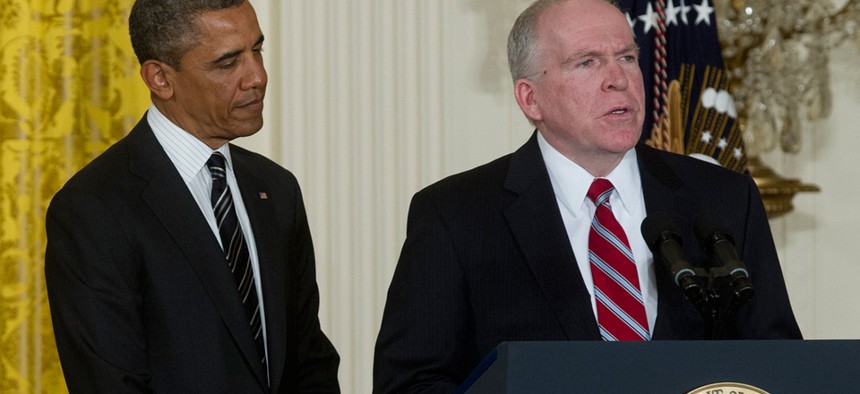
Defense Department
Transparency Groups Want to Oust CIA Chief As White House Backs Him
Brennan accused of violating criminal law and separation of powers.
In the latest twist in the feud between the CIA and the Senate Intelligence Committee over a report on torture, an alliance of 20 transparency advocacy groups has called for the firing of Director of Central Intelligence John Brennan.
The White House on Wednesday restated its previous assertions of full confidence in the director, who recently apologized to senators for having assured them—erroneously, according to a CIA inspector general’s report—that CIA staff did not hack into senate staff computers on loan from the intelligence agency containing raw material on the agency’s controversial use of “enhanced interrogation” of terrorism suspects during the George W. Bush administration.
In an August 12 letter to President Obama, the nonprofit groups—among them the Project on Government Oversight, the Sunlight Foundation, Public Citizen and the Center for Media and Democracy—expressed “grave concern” about the actions of CIA employees and asked that he request Brennan’s resignation.
The CIA employees, the letter states, “improperly accessed or caused access to” confidential Senate computer files; conducted keyword searches of and read Senate staffers’ emails; filed a criminal referral of Senate staff to the Department of Justice that “was not supported” and was based on “inaccurate information” from CIA employees; and “demonstrated a lack of candor” in interviews with the Office of the Inspector General.
“These are certainly grave violations of separation of powers, and quite possibly violations of criminal statutes,” the letter said. “Brennan’s belated, private apology and his referral of the matter to an internal CIA ‘accountability board’ are not an adequate response.”
The nonprofits also asserted that Brennan’s true role in the episode remains unclear, and cited senators’ complaints that the version of the executive summary of the coming report on torture contains too many redactions to allow readers to assign accountability.
Asked for a response by Government Executive, National Security Council spokesman Ned Price referred to recent defenses of Brennan by Obama and White House spokesman Josh Earnest, saying, “We’ll let their unequivocal remarks stand.”
On July 31, Earnest told reporters that Brennan and the CIA press office had publicly confirmed the inspector general’s conclusion in making a judgment that some CIA employees acted in a manner inconsistent with the common understanding reached between the Senate Intelligence Committee and the CIA. That’s the kind of proactive leadership that the president would expect from somebody who has an important job like running the CIA,” Earnest said. “And it in no way impacts any judgment on John Brennan’s strong record of making the kinds of difficult decisions that are necessary to keep the American public safe.”
A CIA spokesman sent a similar response, adding a reference to an earlier statement by CIA Public Affairs Director Dean Boyd defending the report’s redactions. “More than 85 percent of the [Senate] committee’s report on the former detention and interrogation program was returned unredacted,” according to the Office of the Director of National Intelligence. “Half of those redactions are contained in footnotes. That leaves less than 8 percent of the report itself redacted. To be clear, the redactions were the result of an extensive and unprecedented interagency process, headed up by ODNI, to protect sensitive classified information,” Boyd said. “That was the only aim in this process. We are confident that the declassified document delivered to the committee would provide the public with a full view of the committee’s report on the detention and interrogation program. We have begun a constructive dialogue with the committee.”







